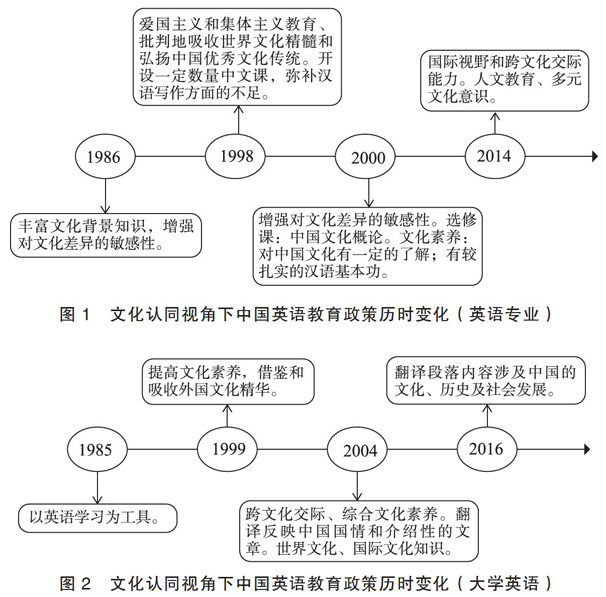改革开放以来中国英语教育“文化认同”规划研究*
 学习者的母语文化认同,并注意处理母语语言文化与外语语言文化之间的关系;(3)相关政策话语主要集中在外语人才定位和课程设置上。影响学习者文化认同建构的还有其他一些政策因素。
学习者的母语文化认同,并注意处理母语语言文化与外语语言文化之间的关系;(3)相关政策话语主要集中在外语人才定位和课程设置上。影响学习者文化认同建构的还有其他一些政策因素。
关键词 英语教育政策;文化认同;语言规划;中国文化;历史研究
中图分类号 H002 文献标识码 A 文章编号 2096-1014(2019)02-0074-09
DOI 10.19689/j.cnki.cn10-1361/h.20190207
Cultural Identity Planning in China: A Diachronic Study of the
English Language Education Policy in China since Opening-up
Liu Yuanyuan, Deng Fei and Zhao Ronghui
Abstract In recent years, English as a Foreign Language (EFL) learners’ identification with their own culture has attracted much attention in China. There has been increasing concerns that learning English may lead to the loss of Chinese culture. Taking textual analysis as a research method, this paper makes a diachronic analysis of 38 English language education policy documents mandated in China since its reform and opening up to the world nearly four decades ago, with an aim to generalize the trends of cultural identity planning in China’s EFL context. It is found that the English language education policies adopted before the year 2000 have a strong instrumentalism orientation, where Chinese cultural identity is rarely touched upon by policymakers. In contrast, intercultural communication ability is emphasized after the year 2000, and learners’ cultural identity cultivation has been foregrounded in the policy documents. Currently, the policy discourses regarding Chinese cultural identity construction are mainly revolving around defining foreign language talents and optimizing curriculum design. Other policy factors, such as medium of instruction, contents of curriculum, family language planning and learners’ motivations, may as well influence learners’ identity construction. The paper concludes that cultural identity construction through top-down policy mechanism would be a prolonged and challenging endeavor.
Key words Foreign language education policy; cultural identity; language planning; Chinese culture; diachronic study
近年來,英语学习者的母语文化认同问题引发了广泛的社会关注,主要表现是学界对中国文化失语现象的鼎沸讨论,学者们声讨英语教育影响了学习者母语和母语文化认同的发展,并呼吁相关政策改革(从丛2000;宋伊雯,肖龙福2009;赵海燕2016;朱敏,等2016;等等)。各地纷纷出台政策,试图通过降低英语在升学考试中的比重来淡化英语教育,进而引导学习者加强母语学习,增强母语文化认同,如北京市出台的《2014~2016年高考高招改革框架方案(征求意见稿)》。此种通过降低英语分值来加强母语学习的做法并未获得广泛的支持,批评者大有人在。例如:程晓堂(2014)指出,关于英语学习的“有用”与“无用”之争中存在着一些片面认识,实施英语教育对培养学生外语能力、促进学生心智发展和促进教育公平有积极的意义;尹洪波(2014)也指出,母语水平下降并非英语之祸,掌握外语有利于传承和弘扬中华文化。当前,这些争议已成为外语规划和决策者不得不面对的现实问题(赵蓉晖2014)。
热门文章:
- 关于法治政府建设工作报告【完整版】2024-04-04
- 开展文明养犬主题宣传活动简报(2024年)2024-04-04
- 重阳节敬老倡议书2024-04-04
- 2024社区12.1艾滋病日活动方案2024-04-04
- 2024年度宣传养老诈骗活动总结(范文推荐)2024-04-04
- 2024客服转正工作总结范本2024-04-04
- 3.12植树节演讲稿2024-04-04
- 2024年度简单个人运输合同2024-04-04
- 2024年度新学期升旗仪式暨开学典礼主持词2024-04-04
- 2024年社区工作队年度总结(2024年)2024-04-04
相关文章:
- 2022年庆祝中国共产主义青年团成立一百周年大会心得体会500字2022-06-10
- 2022政法委贯彻落实《中国共产党政法工作条例》自查报告2022-06-10
- 《中国古代寓言》汇报交流课教案【优秀范文】2022-06-10
- 公安民警领导学习《中国共产党政法工作条例》发言提纲2022-06-11
- 中国好网民个人先进事迹材料【精选推荐】2022-06-11
- 2022年(整理)《中国共产党党组工作条例》贯彻落实情况自查报告2022-06-11
- 2022中国银行流动资金贷款管理细则0322(发文版)(全文)2022-06-11
- 论中国古代继承制度演变(2022年)2022-06-11
- 2022庆祝中国共产主义青年团成立100周年思想汇报12022-06-12
- 2022年度中国共产党百年辉煌党课讲稿(全文完整)2022-06-13
- 文化认同有哪些2022-06-22
- 2022年幼儿园后勤三年规划学校后勤工作三年规划书2022-06-11
- 幼儿园后勤三年规划学校后勤工作三年规划书2022-06-16
- 2022年大学生规划计划(完整文档)2022-08-07
- 试论智能电网规划在电力系统规划中的应用2022-11-03
- 浅论建筑规划设计中的节能减排设计2022-11-03
- 试论城市建筑色彩规划设计2022-11-03
- 试论乡村景观在风景园林规划设计中的融入2022-11-03
- 森林调查规划设计的方法与技术应用研究2022-11-11
- 中国传统文化在建筑规划设计中的应用2022-11-15
- 2023年市金融业十三五规划总结和十四五规划打算(完整文档)2023-05-31
